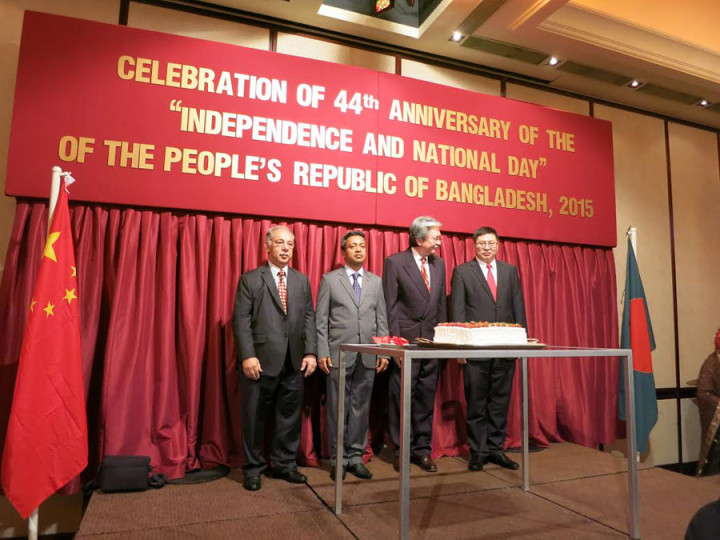The “AIIB” is the Asian Infrastructure Investment Bank, a new multilateral development bank as proposed by Xi Jinping in a speech to the Indonesian parliament in October 2013. The concept as expressed then was: “to support the process of interconnection and integration of the economic development in the region,” continuing, “China has proposed to build the Asia infrastructure investment bank and provide financial support to infrastructure development in developing countries in the region.”
The bank was formally established on October 24, 2014 in a ceremony in Beijing. Twenty-one founding members signed the bill. It is expected that the bank will be capitalized mostly by China with between $50 billion and $100 billion.
The founding members of the bank were China of course, India, Thailand, Malaysia, Singapore, the Philippines, Pakistan, Bangladesh, Brunei, Cambodia, Kazakhstan, Kuwait, Laos, Myanmar, Mongolia, Nepal, Oman, Qatar, Sri Lanka, Uzbekistan, and Vietnam.
Thirteen more members have joined since then, most notably the UK, France, Germany and Italy, as well as New Zealand, while Australia, South Korea and Taiwan are currently considering joining despite that the USA has stated its unease as it has told its allies that joining the bank would be tantamount to accommodating China – “accommodation of China, which is not the best way to engage a rising power.”
However, since the IMF, the World Bank and the Asian Development Bank all came out in favour of the AIIB, Washington changed its tune with US Treasury Under Secretary for International Affairs Nathan Sheets saying “The US would welcome new multilateral institutions that strengthen the international financial architecture.”
Bangladesh is one of the early subscribers among China’s neighbours, allies and trading partners in Asia and likewise would welcome investment in basic infrastructure to get reliable electricity, access to clean water, sanitation facilities and transportion.
Representing Bangladesh at the recent 18th Asian Investment Conference (AIC) of Credit Suisse, was Dr. S A Samad, Executive Chairman of the Bank of Overseas Investment (BOI) and holding the rank and status of Minister. A former Principal Secretary, Dr. Samad has more than 35 years experience as a civil servant, economist, academic and development consultant.
Mr Samad was accompanied by the Consul General of Bangladesh in Hong Kong Mohammad Sarwar Mahmood,. During the Conference, Dr. Samad spoke as a ‘Keynote Speaker’ in the ‘Keynote Panel’, titled, ‘When will frontier markets prove rewarding to investors?’, speaking on the development of Bangladesh in the frontier market as well as the business climate and investment trends in the country.
He wisely bypassed any comment of the deadlocked political situation but stuck to the business positives such as the National Industrial Policy of Bangladesh where: private sector is treated as the engine of growth, that 100 per cent foreign equity is allowed, no upper ceiling for foreign investors or performance requirements, equal treatment for both local and foreign investment, all of which attract outside funds but in this writer’s opinion can too easily lead to employment injustices. Samad added that under Public private Partnership (PPP), 42 projects with an approximate worth of around US$14 billion are in various stages of implementation.
As for the AIIB itself, commentators have already noted that it can function as a means for China to use its excesses of funds without being blamed for meddling in other nations’ affairs. As the controlling interest in the AIIB, Beijing can direct money toward investments it will benefit from, such as helping Laos construct its end of the Kunming-Singapore railway. It will also likely contribute to the internationalization of the RMB.
China is a risen and rising power; the US has gone over it’s economic top but is still incredibly rich and powerful. The USA is concerned, however, by the appearance of counter-institutions like BRICS, or anything in fact that challenges that might. It’s the western way of competitive capitalism mounted atop of irrational fears of anything to do with Socialism-Communism.
Off the mainstream a substantial number of states and organisation are fed up with the military dalliances of the USA, engaged as it is violently supporting its end of the East-West divide. Thus, all opposition to the policies of the NATO block and against the USA’s ability to operate hegemonically are welcomed by today’s disenfranchised.






